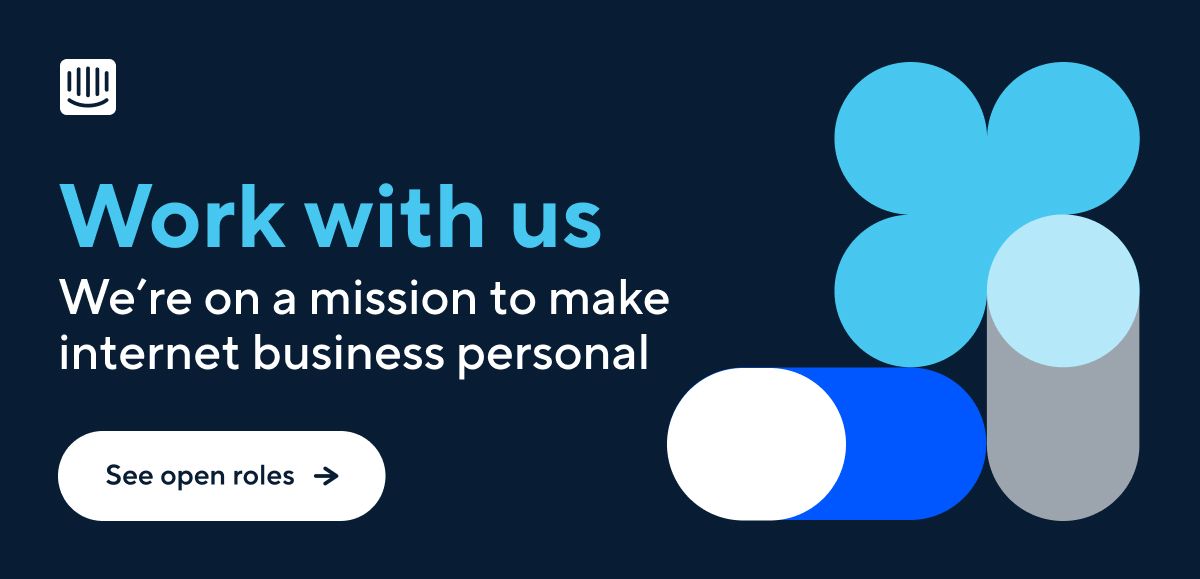
Why being new can be empowering and not terrifying
Main illustration: Jeannie Phan
Congratulations on your new job! You’re likely meeting heaps of new people, putting your dog’s photo on your desk, and you’re at inbox zero (good luck making it last).
Sound familiar? It does to me because I recently joined Intercom. But this ain’t my first rodeo – I’ve had many jobs and even switched careers over the past 20+ years. That’s how I know being new is a frightening, vulnerable experience. Even in the best organizations, it’s challenging to determine what a company values, how its strategy works, what success looks like and how you fit in.
Being new isn’t just an experience – it’s a hard-earned skill. Here’s what I’ve learned about making the most of it.
“Being new isn’t just an experience – it’s a hard-earned skill”
1. Set learning milestones
Our Senior VP of Product Paul Adams often says when you’re new, “it’s normal not to know.” So start strong by actively planning for what you need to know to be effective. Create a series of learning milestones: document a plan to meet people, join team rituals, read documents, learn how to use tools, participate in processes. Set goals for gathering the context you need to know and share those goals with your colleagues. This helps them see your journey to becoming a great partner.
But that journey doesn’t come without stumbles along the way. Give yourself permission to make mistakes. No one else can give you that permission – you have to give it to yourself. When you make mistakes, show your partners what they want to see more than anything else: that you ask for their feedback, understand where you went wrong and show your commitment to improvement.
“Dare yourself to openly align with your team on what you need to learn to be effective”
If you don’t do this, you’ll risk losing their confidence and trust. Your mistakes will make you overly cautious, especially if you’re already feeling like an impostor. You may start asking Is it okay if I… or Do you think I should… or even Can I…?.
All of that asking slows you and your team down. You’ll grow slower – and so will your team – if you ask for permission to do every single thing. That’s why your goal shouldn’t be to avoid mistakes at all costs or always wait to act until you’re absolutely sure that you’re 100% right.
Dare yourself to act sooner and learn faster. Better yet, dare yourself to openly align with your team on what you need to learn to be effective. Bring them along on your journey so you can all learn together.
2. Be known for one thing
Remember that your new colleagues don’t know you, what you do best or how you do it – or perhaps even why it matters. But in any “move fast” organization, they need to know these things to work effectively with you.
Ella Harris, a content strategy director at Facebook, taught me that it’s not my team’s responsibility to get to know me. Rather, it’s my responsibility to show them what I do, why it’s valuable, and how they can get the most of that value from working with me. The sooner I show them what’s most important to me, the sooner we can all move from awkward introductions to solving hard problems together.
“Being open about what you value helps people understand how they can best work with you”
That’s why I avoid introducing myself with titles, seniority or experience. Those things don’t say much about what I can do or care about. Instead, I’ve found much more success by showing people the one, most important thing I want them to remember. Being known for excellence in just one thing is far better than for mediocrity in a million.
I always tell people that I “make the unclear be clear,” an amazing quote from the brilliant Abby Covert. It shows what I strive for in my work – everyone understands that I care about being clear more than anything else. They know I’ll always hold the team accountable for clarity and simplicity above all other things.
Being open about what you value helps people understand how they can best work with you. But it’s often the thing that we keep most secret. Don’t make people guess – they shouldn’t have to read your mind! Share your values openly to show people how you can make an impact with them.
3. Ask people what they’re learning
Some workplaces believe in a sort of “magical thinking” that you can just learn anything you need to know through exposure to your new peers. If you walk the halls, get coffee with the right people, or just attend enough meetings, you’ll eventually “get it.” Strategy, values, jargon, process, impact … just hang around long enough and you’ll be one of us!
In a word: bullshit.
Learning by osmosis isn’t a thing. If that were possible, there’d be no need for all those meetings, 1-on-1s, documents, performance reviews, or anything else where people get specific about what they’re doing, what problems they’re trying to solve, and what they need from you to solve them. We need all those things because of the oldest truth in human history: all problems are communication problems.
“The best way to accelerate your learning is by asking these people: ‘What’s something you’re learning right now?’”
In healthy organizations, everyone’s always learning. The people who are most senior, most tenured, your manager, their manager – everyone should always be learning. Any company whose leaders aren’t learning is a company that ain’t gonna be around for long.
The best way to accelerate your learning is by asking these people: “What’s something you’re learning right now?”
We don’t usually ask each other this, but we should. When I’m new on a team or meeting someone for the first time, it’s my favorite question to ask because it gives me a preview of the future. That really hard thing my colleague is struggling with right now? I’ll be struggling with it soon enough!
Asking a personal question like this also shows that you care about your colleagues. It earns their trust, especially when you follow it up with “How can I help?”
4. Find your buddy
The Kool-Aid™ you drink during your first few days of your new job sure is tasty. Everyone’s so smart and friendly! Their strategy is so brilliant and their products are amazing. How could folks ever get upset about anything here?
But that sweetness can wear off fast. Maybe for you it’s wearing off right now. Things don’t seem so amazing anymore, you might feel confused or hurt, and you’re looking for a little help to get over the rough patch.
You need a buddy. This is someone who doesn’t manage you and may not be on your team or even someone you work with regularly. That’s okay, because they don’t need to understand the details of your day-to-day work … they just need to understand you.
“None of us are complete by ourselves – we never will be”
None of us are complete by ourselves – we never will be. It’s not a sign of weakness to turn to someone else to help you make sense of things, it’s a sign of strength and awareness that you need additional perspective. Or a sounding board for your ideas. Or just a good listener.
Keep an eye out for your new buddy. Maybe that’s them now at the coffee machine. Or maybe it’s the person who’s red-faced, flustered, and needs someone to lean on. Whether you meet for lunch, go for a run together, carpool to work, or just have a quiet chat outside, your buddy can be an incredibly stabilizing force.
They’ll ground you, strengthen your foundation, and help you see things in new ways – and you’ll do the same for them.
5. Just say the thing
You know that awkward moment when everyone in a room is thinking the same thing… but not saying it? Maybe it’s organizational politics that keeps them quiet. Maybe it’s self-imposed pressure brought on by the fear of being wrong. Or maybe it’s just that they’re waiting for someone else to be brave first.
Listen: that person should be you. You should be the one to say the thing. Being new gives you a license to break the silence – and it’s an opportunity to cast yourself in this crucial role for the rest of your tenure.
“Being new gives you a license to break the silence”
Deborah Liu, VP of Facebook Marketplace, helped me understand that the best way to help teams align is to be bold about saying the thing. This is the best way to turn abstract ideas and fears into things that are more concrete, which makes them something a team can discuss out loud. And when we talk about things openly, then we can align on what they mean and decide what to do about them.
But if no one speaks up, then everyone stays stuck in their heads and we avoid the real issues. I often struggle here, so I know that the issues you avoid are the ones that end up defining you, your products, and your company. The problems that you can’t discuss – the arguments you don’t have – will always lead to the worst decisions you’ll ever make.
So just say the thing. It’s an act of confidence, but also one of kindness: you’re giving your colleagues a gift that helps them get more aligned and make a better decision. As Deb says, “If no one says the thing, how will you solve the problem?”
Take advantage of the opportunities
Being new is hard. I know that because I’m new right now – maybe you are, too.
As much as you practice these behaviors, being new will always be hard. But you’ll never have a better chance to learn as you will during your first few months. The strengths you develop when you’re new will serve you even better as you transform into a wise veteran at your organization.
So when you find opportunities, take advantage of them. Jump in with both feet, ready to learn and help your team move faster, better, together.
That’s how to be new.








